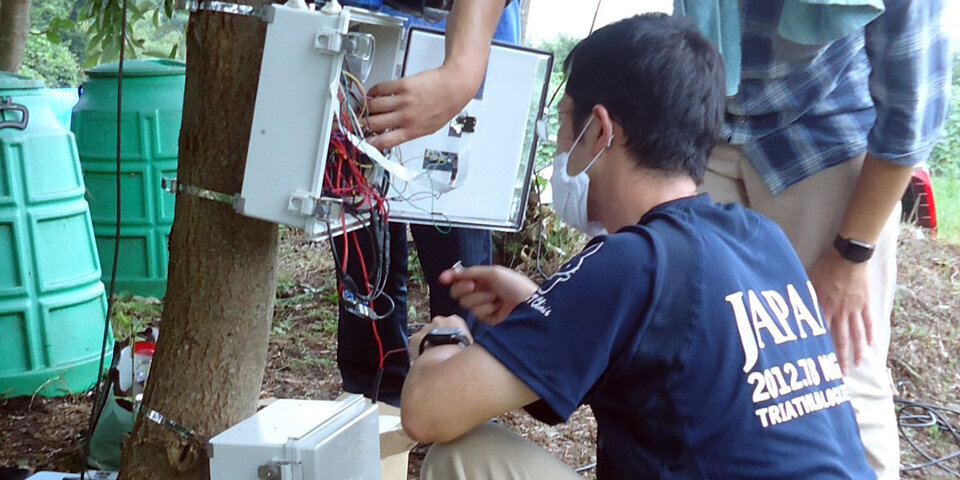
Topics
- 2024.12.04
UoA Joint Research Forum 2024 Held
Studies and Collaborations - 2024.10.30
UoA Joint Research Forum 2024
Studies and Collaborations - 2024.04.09
The research findings on "Optimization Design of Semiconductor Mask Patterns," a collaborative research conducted by researchers from the University of Aizu, Tokyo Institute of Technology, and Kioxia Corporation, were featured in Nikkei xTECH.
Studies and Collaborations 2024.02.09 - 2023.09.01
UoA Joint Research Forum 2023 will be held
Studies and Collaborations - 2023.07.03
ARC-Vision is newly established
OthersStudies and Collaborations - 2023.06.15
The 8th University of Aizu Robot Symposium Held
Event Report - 2022.11.21
Aizu-Wakamatsu Chamber of Commerce and Industry Businesswomen's Club and the University of Aizu held an exchange program.
OthersNews Release - 2022.08.29
UoA Joint Research Forum 2022 was held.
Studies and CollaborationsEvent Report - 2022.07.28
UoA Joint Research Forum 2022
News ReleaseStudies and Collaborations
About CAIST
CAIST promotes pioneering research and technological development that responds to social needs as a team (a.k.a cluster), aiming to industrial development and competitiveness of local technology-based companies with the results of the outcome.
In collaboration with other universities and external organizations, CAIST promotes research in the focus areas through a crosscutting research system.
Since its establishment in 2009, clusters in a wide range of fields, from environment and medicine to space, have been active in response to technological advances and social demands.
As of July 2023, three clusters are active in the fields of robot information engineering , IoT and vision.
- Related Link
- CAIST Faculty
Aizu Research Cluster for Robot (ARC-Robot)
As robots are strongly expected to contribute to our society, the University of Aizu will apply our information communication technologies to robotics for evolving robots to the next stage, as well as creating a new field of study in computer science and engineering from the experience of development of robots.
Aizu Research Cluster for Internet of Things (ARC-IoT)
The goal is to realize small-scale low energy IoT devices support smart IoT systems that include artificial intelligence(AI).
Aizu Research Cluster for Vision (ARC-Vision)
We conduct research and development of state-of-the-art image and signal processing methods using artificial intelligence (AI) to solve and improve problems related to human health and the living environment.
Former Clusters
☆ ARC-Space (Project Period:2009-2019)
ARC-Space aimed to continue supplying software to support deep space exploration in the geoinformatics, Geographic Information System (GIS), and image processing areas, based on our past research achievements. Furthermore, it aimed to promote collaboration with local industries by utilizing the technologies acquired through its space development in high-tech industries.
* ARC-Space was designated as a joint usage / research center (the Center for Lunar and Planetary Exploration Archive Science) by the Ministry of Education, Culture, Sports, Science and Technology (MEXT) in April 2019. Following the designation, the former ARC-Space (Aizu Research Cluster for Space Science) was reorganized from one of the subordinate organizations of the Center for Advanced Information Science and Technology (CAIST) into the current Aizu Research Center for Space Informatics (ARC-Space), an independent research center.
related page: Aizu Research Center for Space Informatics (ARC-Space)
☆ ARC-Medical (Project Period:2009-2014)
ARC-Medical aimed to support further development of medical-device manufacturing in Fukushima Prefecture and foster talent who can be successful in multidisciplinary areas that integrate medical science and computer science.
☆ ARC-Environment (Project Period:2009-2014)
ARC-Environment conducted local meteorological analysis in Aizu area. The data provided by the cluster is used for preventive measures against disasters and damage to agricultural products. By doing so, it aimed to contribute to the promotion of agriculture and the improvement in the environmental comfort in the region.
☆ ARC-BME (Project Period:2015-2021)
ARC-BME aimed to conduct theoretical research and computer simulations on sudden cardiac death, which claims many lives in Japan and abroad, to investigate the mechanism of its occurrence and to help prevent, predict, and treat it, thereby establishing a unique CoE (Center of Excellence).
*BME: Biomedical Information Engineering
☆ ARC-HPC (Project Period:2015-2020)
ARC-HPC aimed to realize the innovative technologies needed for future high-performance computing. To respond to increased power consumption and lower the cost of current computers, it also conducted research that integrates software and hardware, aiming to realize computers that are scalable, cost-effective, and have low power consumption to performance ratio.
*HPC: High-Performance Computing
☆ ARC-Cloud( Project Period:2015-2021)
ARC-Cloud supported cyber-physical systems by conducting R&D in design and construction / operation methods to realize secure and flexible cloud computing. By doing so, it aimed to achieve results in areas such as sensor network, robot assistance, and energy management systems.


